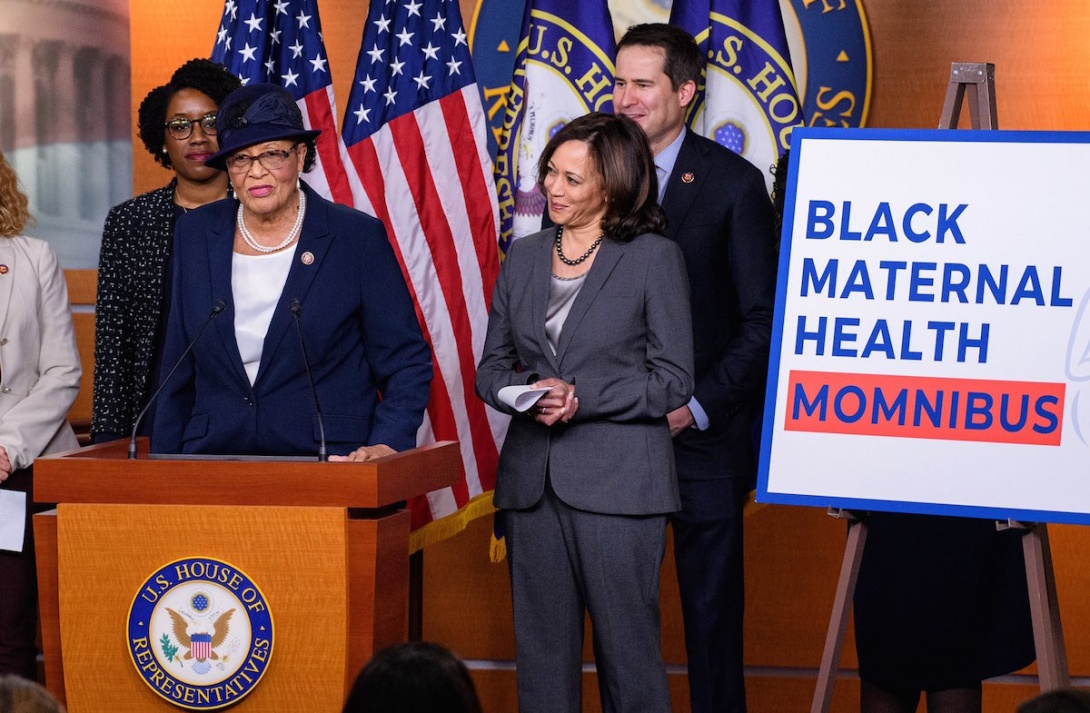Addressing Black maternal mortality in the South

U.S. Rep. Alma Adams, a North Carolina Democrat, is seen here speaking last year about the Black Maternal Health Momnibus, a package of legislation aimed at bringing down the high maternal mortality rate in the Black community. To her right stands co-sponsor Rep. Lauren Underwood of Illinois. (Photo by Adams' office via Wikimedia Commons.)
After Gloria De Los Santos gave birth to her second daughter 12 years ago, she hemorrhaged. She called for a nurse who suggested they go to the bathroom.
"When I got up, blood gushed out," said De Los Santos, who is Black. "My husband ran out to find a doctor because some of the nurses behind the desk weren't taking it seriously."
"What really got to me was that if my husband and that one nurse weren't there, I probably would have died," she said.
De Los Santos's post-pregnancy experience illustrates the nationwide Black maternal health crisis. In 2018, the maternal mortality rate for Black mothers in the United States was 37.3 per 100,000 live births, compared to 14.9 per 100,000 live births for white mothers, according to the Centers for Disease Control and Prevention (CDC).
De Los Santos is now the director of the Durham office of Action NC, a grassroots group that works to address poverty and inequality. This month, she launched a Black maternal health campaign in the state to encourage the adoption of policies to improve health outcomes for Black mothers. The campaign launch coincided with the reintroduction of the so-called "Momnibus Act" in Congress, and it comes as North Carolina state Sen. Natalie Murdock (D) prepares to introduce a Black maternal health bill in the General Assembly.
U.S. Rep. Alma Adams of North Carolina, along with Rep. Lauren Underwood of Illinois and Sen. Cory Booker of New Jersey, all Democrats, introduced the Black Maternal Health Momnibus Act on Feb. 8. The set of 12 bills, which expands on a similar act introduced in 2020 before the start of the coronavirus pandemic, calls for several measures to address the crisis, including an increase in data collection on maternal health outcomes, funding for community-based organizations, and investing in telehealth for mothers.
The Action NC campaign and Murdock's bill also call for Medicaid expansion to cover doula services and postpartum check-ins with doctors. North Carolina is one of only 12 states, eight of them in the South, that have not expanded Medicaid to more residents under the Affordable Care Act.
"The importance of expanding Medicaid is for individuals who do not have health care," De Los Santos told Facing South." We have a lot of women that fall up under that income classification. They can't afford the services, or they don't know where to go and get those services that they need to help them with preexisting conditions or unknown conditions that they might not know they have before or during their pregnancy."
Murdock said her bill will expand on a similar measure she introduced during the last legislative session to extend Medicaid coverage for doula services. A doula is a non-medical professional trained to provide emotional and physical support during pregnancy and during and after childbirth. Studies have found that mothers who work with doulas have shorter labors, are less likely to need C-sections, and request less pain medication.
But due to affordability issues, Murdock said, "women that can benefit the most from these services simply cannot have them."
Like the Momnibus Act, Murdock's bill will also call for an expansion of telehealth resources, improvement of data collection, and funding for health care community organizations and nonprofits. In addition, Murdock supports creating an implicit bias commission to study discrimination against mothers of color in the health care field. "Some mothers are not treated with the care they need," she said.
Doulas and maternal health care-related nonprofit organizations, whose services have been dramatically changed by the pandemic, are calling on policymakers to address the Black maternal health care crisis in North Carolina.
Melanie Patrick, the co-owner of Emerald Doulas in Durham, favors Medicaid expansion for doula services but noted that Medicaid does not currently pay a living wage to doulas. "As long as Medicaid isn't going to dictate how the doulas do our work, I would absolutely support it," she said.
Emerald Doulas maintains a fund for low-income mothers who cannot afford the full price of services. Clients are allowed to pay what they can and the remaining balance is supplemented from the fund, according to Patrick.
She also favors implicit bias training for health care professionals. "For the providers who actually take the training, I think it would help them start thinking about their biases," Patrick said. "It's also important that the practices that bring those trainings to their staff also follow up. All too often a training is done and they're like that's it, we took it."
"If they take on the work and do it, it will save lives — for not only the birthing person, but also the babies. It will also build confidence," she said. "A lot of our clients go into their birthing time afraid, wondering if they're going to make it. With our white clients, typically their biggest concern is will I have a C-section or not. Our Black clients are afraid they're not going to live through it."
Fear of death looms
No states in the South currently cover doula services under Medicaid. Low-income mothers have to seek other ways to pay for perinatal care. In the Triangle area of North Carolina, pregnant people can seek help from community-based organizations such as Equity Before Birth.
The nonprofit raises and distributes funds and supplies to low-income mothers in Durham and the surrounding area. Equity Before Birth was created in late 2020 after the founder saw an increase in need among pregnant women during the pandemic.
According to Joy Spencer, the organization's executive director, Equity Before Birth supplements the income of mothers who are not able to take maternity leave. It will also pay for doula services in addition to supplying baby food and essentials like cribs and diapers.
For Spencer, the advocacy work is personal. She suffered from polycystic ovary syndrome, a hormonal disorder common among women of reproductive age, and doctors gave her an infertility diagnosis. Now she has a 2-year-old daughter, but during her pregnancy she went through a period of unemployment and did not receive the level of concern from doctors that she wanted.
"I never got personalized care," Spencer said. "I didn't feel empowered."
Black maternal health care problems are pervasive in the South — particularly in Louisiana and Georgia, two states with consistently high Black maternal mortality rates.
In 2018, the Louisiana Department of Health released a report on maternal mortality and found that Black women in the state were four times more likely than white women to die from pregnancy.
The state health department directed an initiative called the Louisiana Perinatal Quality Collaborative to address the racial disparities in maternal health care. The Collaborative, which includes many hospitals and birth centers in the state, focused on reducing rates of hemorrhage and hypertension, two leading causes of maternal death, and Medicaid expansion for pregnancy. Louisiana expanded its Medicaid program under ACA in 2016, and it covers pregnancy care.
In May 2020, the Collaborative released an interim report on its Reducing Maternal Morbidity Initiative that found that maternal morbidity has decreased among women who have high blood pressure and hemorrhages by 22% and 39.3%, though the racial gap between Black and white mothers has not significantly improved. A full analysis of the data is expected to be completed in mid-March, according to Kevin Litten, a spokesperson for the Collaborative.
Another problem for pregnant people and mothers in Louisiana is access to health care, according to Laneceya Russ of Baton Rouge, the executive director of the nonprofit organization March for Moms. "We have rural areas in our state. Access to transportation, to get to their appointments, and access to doctors who will listen to them and understand things that may be going on" is an issue, she said.
The fear of death in childbirth looms large for many mothers in Louisiana, especially if they receive a COVID-19 diagnosis, Russ said. At least two pregnant women in Louisiana died from complications of the virus after giving birth last year. While there is little research on the effects of the coronavirus on pregnancy, pregnant people in Louisiana are now eligible to get vaccinated — news that Russ called "a relief for moms" in the state.
In Georgia, Black women are three times more likely to die from pregnancy complications than white women, according to the CDC. Gov. Brian Kemp (R) signed a bill into law in July that expanded Medicaid coverage for mothers from two to six months after birth, according to WABE, and $20 million was included in the state budget last year to address the maternal mortality crisis.
The South consistently ranks low on maternal health care measures. The latest annual March of Dimes report card on the health of mothers and children by state gave seven of the 13 Southern states an F and five others a D. The region's highest mark was a C for Virginia.
Advocates and policymakers believe better data collection, Medicaid expansion, and better access to doulas could improve maternal health care outcomes for all mothers.
"The importance of this campaign, this movement, is not just to address the health care issues of Black women but to actually give us the platform to where women like ourselves and women that are coming behind us will not have to deal with this particular issue," said De Los Santos.
Tags
Elisha Brown
Elisha Brown is a staff writer at Facing South and a former Julian Bond Fellow. She previously worked as a news assistant at The New York Times, and her reporting has appeared in The Daily Beast, The Atlantic, and Vox.
